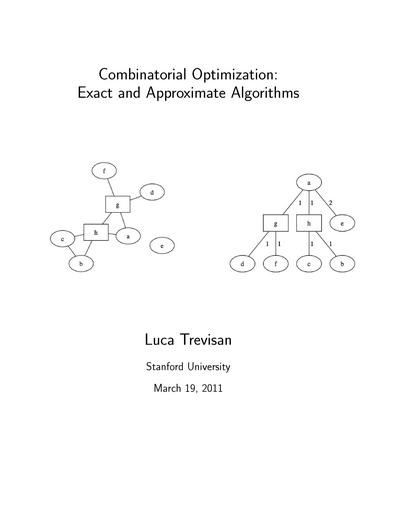
Combinatorial Optimization: Exact and Approximate Algorithms
Lecture notes from the class CS261: Optimization and Algorithmic Paradigms taught at Stanford. They cover topics in approximation algorithms, exact optimization, and online algorithms.
Publication date: 11 Mar 2011
ISBN-10: n/a
ISBN-13: n/a
Paperback: 139 pages
Views: 12,955
Type: Lecture Notes
Publisher: n/a
License: Creative Commons Attribution-NonCommercial-NoDerivs 3.0 Unported
Post time: 23 Oct 2016 07:00:00
Combinatorial Optimization: Exact and Approximate Algorithms
 Lecture notes from the class CS261: Optimization and Algorithmic Paradigms taught at Stanford. They cover topics in approximation algorithms, exact optimization, and online algorithms.
Lecture notes from the class CS261: Optimization and Algorithmic Paradigms taught at Stanford. They cover topics in approximation algorithms, exact optimization, and online algorithms.
Publication date: 11 Mar 2011
ISBN-10: n/a
ISBN-13: n/a
Paperback: 139 pages
Views: 12,955
Document Type: Lecture Notes
Publisher: n/a
License: Creative Commons Attribution-NonCommercial-NoDerivs 3.0 Unported
Post time: 23 Oct 2016 07:00:00
Share — copy and redistribute the material in any medium or format
The licensor cannot revoke these freedoms as long as you follow the license terms.
Click here to read the full license.
More resources are available at the course webpage.
From the Introduction:
Trevisan wrote:In this course we study algorithms for combinatorial optimization problems. Those are the type of algorithms that arise in countless applications, from billion-dollar operations to everyday computing task; they are used by airline companies to schedule and price their flights, by large companies to decide what and where to stock in their warehouses, by delivery companies to decide the routes of their delivery trucks, by Netflix to decide which movies to recommend you, by a gps navigator to come up with driving directions and by word-processors to decide where to introduce blank spaces to justify (align on both sides) a paragraph.
In this course we will focus on general and powerful algorithmic techniques, and we will apply them, for the most part, to highly idealized model problems.
Some of the problems that we will study, along with several problems arising in practice, are NP-hard, and so it is unlikely that we can design exact efficient algorithms for them. For such problems, we will study algorithms that are worst-case efficient, but that output solutions that can be sub-optimal. We will be able, however, to prove worst-case bounds to the ratio between the cost of optimal solutions and the cost of the solutions provided by our algorithms. Sub-optimal algorithms with provable guarantees about the quality of their output solutions are called approximation algorithms.
Tweet
About The Author(s)
Professor of Electrical Engineering and Computer Science at U.C. Berkeley and senior scientist at the Simons Institute for the Theory of Computing. Studied at the Sapienza University of Rome, advised by Pierluigi Crescenzi. Took a post-doc at MIT (with the Theory of Computing Group) and at DIMACS, joined as an assistant professor at Columbia University and a professor at Stanford. Interested in Theoretical Computer Science.
Professor of Electrical Engineering and Computer Science at U.C. Berkeley and senior scientist at the Simons Institute for the Theory of Computing. Studied at the Sapienza University of Rome, advised by Pierluigi Crescenzi. Took a post-doc at MIT (with the Theory of Computing Group) and at DIMACS, joined as an assistant professor at Columbia University and a professor at Stanford. Interested in Theoretical Computer Science.